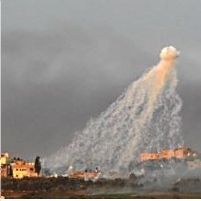White Phosphorus: War of Blame Escalates in Afghanistan
Wednesday, May 13, 2009
 White phosphorus in Gaza
White phosphorus in Gaza
The U.S. military has launched a full-scale public relations battle over an attack in Afghanistan last week that apparently involved a chemical outlawed by international treaties. At issue is who used white phosphorus on the people of Farah province: American soldiers or Taliban guerillas? Following U.S. air strikes on May 4 against the Taliban, which Afghan officials claim killed as many as 130 civilians, local doctors reported treating 14 patients with “unusual” burns. Speculation immediately focused on white phosphorus, which erupts in flame on contact with air and can stick to flesh, causing severe burns.
Both sides in the conflict have reportedly used the chemical, although Pentagon officials insist the U.S. only uses white phosphorus to illuminate the battlefield or produce smoke screens, which is not prohibited by international law—and not directly as a weapon, which is banned under treaties that forbid using chemicals as weapons. Human rights groups, however, have argued that using the chemical over populated areas can indiscriminately burn civilians and constitutes a war crime.
With public support for American operations waning among Afghanis, the U.S. has tried to steer blame for the Farah burn victims toward the Taliban, insisting there are at least 44 documented incidents of militants using white phosphorus against American forces. A U.S. spokeswoman labeled the attacks “reprehensible,” with the most recent coming last Thursday when militants used white phosphorus as part of an assault on a NATO outpost in Logar. The Taliban have gained access to the chemical through old weapons caches left over from earlier conflicts, and from supporters in Pakistan.
Hundreds of people marched near Kabul University last weekend to protest the U.S. military’s role in the deaths in Farah province. Protesters carried signs denouncing the U.S. and chanted anti-American slogans, and President Hamid Karzai condemned the attack while calling for an end to air strikes.
U.S. National Security Adviser James Jones said the United States would not end air strikes, arguing that to do so would amount to fighting the war “with one hand tied behind our backs.”
-Noel Brinkerhoff
Concerns White Phosphorus Used in Afghan Battle (by Jason Straziuso and Rahim Faiez, Associated Press)
U.S. Denies Using Chemical in West Afghan Battle (Reuters UK)
Afghan Parliament Wants Law to Curb Foreign Troops (by Sayed Salahuddin, Common Dreams.org)
Militants Accused of White Phosphorus Use (Associated Press)
- Top Stories
- Unusual News
- Where is the Money Going?
- Controversies
- U.S. and the World
- Appointments and Resignations
- Latest News
- Trump Orders ICE and Border Patrol to Kill More Protestors
- Trump Renames National Football League National Trump League
- Trump to Stop Deportations If…
- Trump Denounces World Series
- What If China Invaded the United States?






Comments